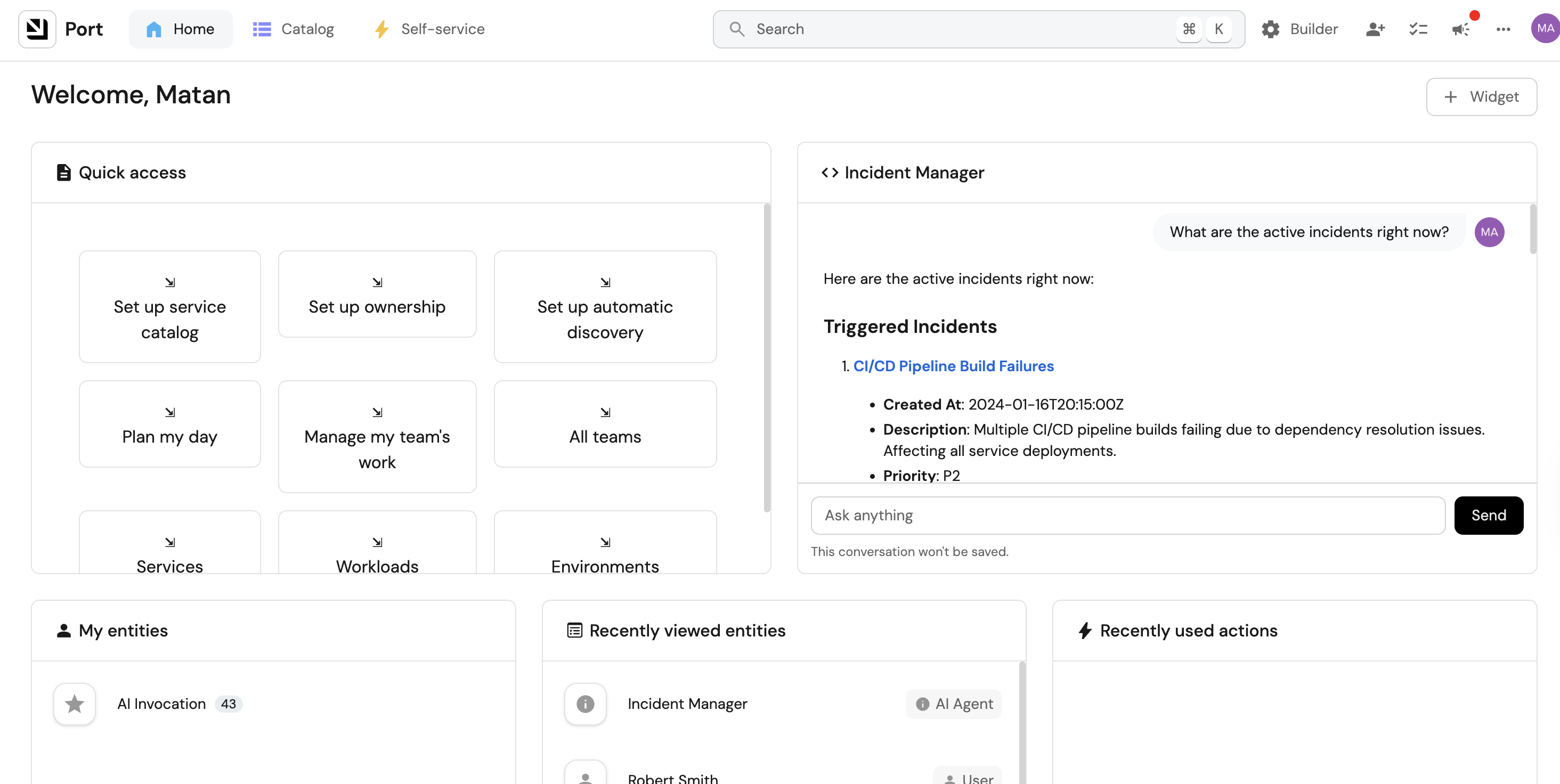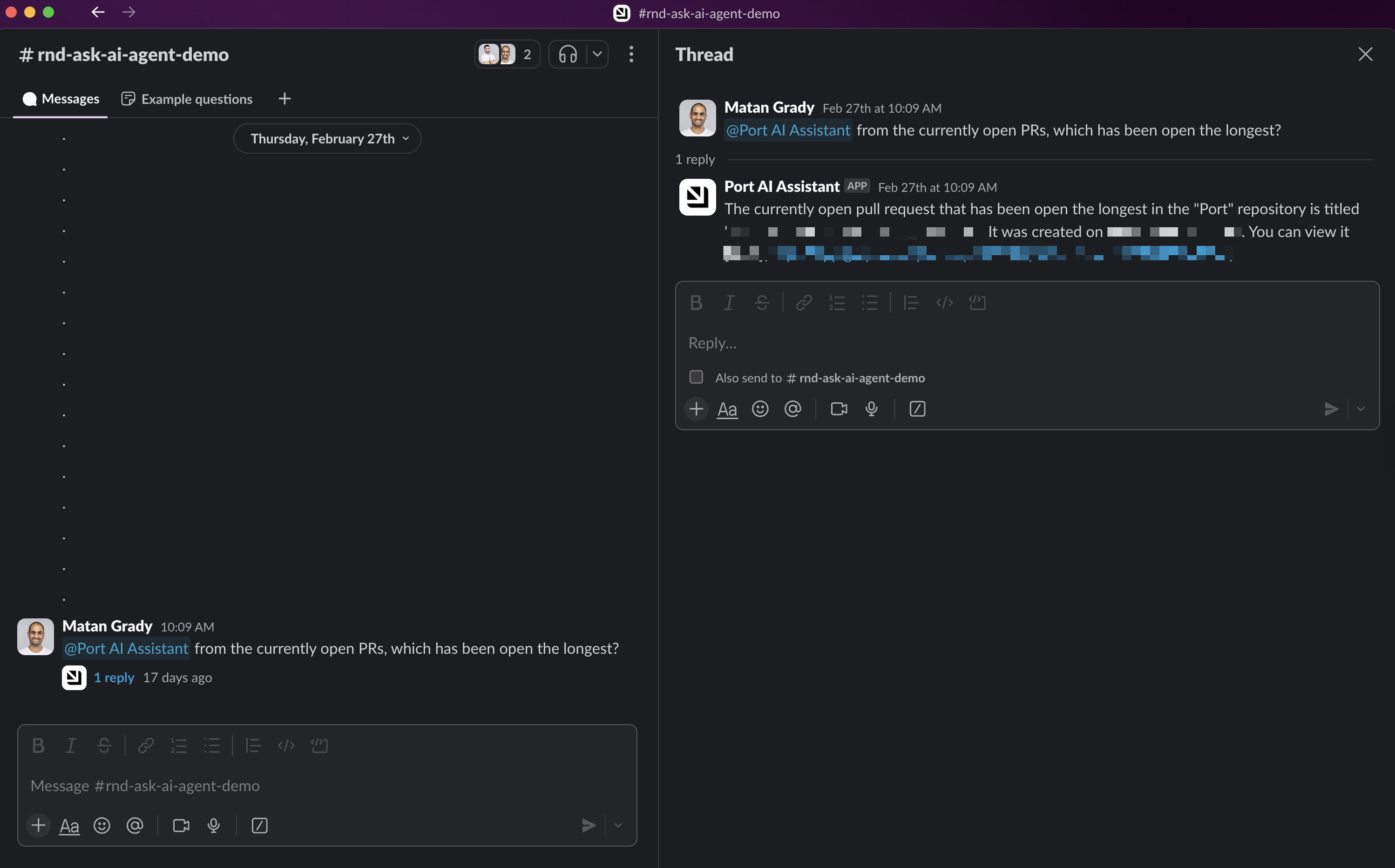AI agents overview
Port's AI offerings are currently in closed beta and will be gradually rolled out to users by the end of 2025.
What are Port AI Agents?
Port AI Agents are pre-configured, domain-specific entities built on Port AI that enable intelligent machine-to-machine communication. Unlike general AI assistants designed for human interaction, AI Agents are purpose-built for specific domains (like incident management, deployment orchestration, or security monitoring) and excel at autonomous operations within defined boundaries.


Agent Characteristics
AI Agents are distinguished by three key characteristics that make them ideal for machine-to-machine workflows:
- Domain Ownership - Each agent is specifically designed for a particular domain or function (incident management, security monitoring, deployment orchestration).
- Autonomous Operation - Agents operate independently within defined boundaries , making them perfect for automated workflows, background monitoring and alerting, and system-to-system communication where human intervention isn't required.
- Reusability Across Systems - Agents can be integrated into multiple systems and workflows, like API-driven integration, third-party system integrations, etc.
When to Use AI Agents vs Port AI
Choose AI Agents when you need:
- Machine-to-machine communication for automated workflows.
- Domain-specific expertise (e.g., incident response, security analysis).
- Autonomous operations that run without human intervention.
- Reusable logic that can be embedded in multiple systems.
Choose Port AI when you need:
- Human interaction and conversational interfaces.
- General-purpose queries across your entire catalog.
- Ad-hoc exploration and discovery.
Agent-Specific Use Cases
AI Agents excel at machine-to-machine scenarios that require domain expertise and autonomous operation:
- Kubernetes Healing Agent
- Incident Response Agent
- Security Compliance Agent
This agent automatically monitors and heals Kubernetes infrastructure by detecting failures, analyzing resource constraints, and triggering remediation workflows through monitoring system integrations.
Tools this agent would have:
- Kubernetes cluster monitoring and diagnostics.
- Resource utilization analysis tools.
- Pod restart and scaling automation.
- Alert correlation and notification systems.
Example scenarios:
- Automatically detects pod failures and restart issues.
- Analyzes resource constraints and suggests scaling actions.
- Integrates with monitoring systems to trigger remediation workflows.
This agent streamlines incident management by monitoring service health, creating automated incident reports, and reducing alert noise through intelligent correlation while keeping stakeholders informed throughout outages.
Tools this agent would have:
- Service health monitoring and alerting.
- Incident creation and management tools.
- Multi-system alert correlation engines.
- Stakeholder notification and communication systems.
Example scenarios:
- Monitors service health and automatically creates incident reports.
- Correlates alerts across multiple systems to reduce noise.
- Provides automated status updates to stakeholders during outages.
This agent continuously maintains security posture by scanning for vulnerabilities and misconfigurations, creating prioritized remediation tickets, and preventing vulnerable code from reaching production through CI/CD integration.
Tools this agent would have:
- Vulnerability scanning and assessment tools.
- Security misconfiguration detection systems.
- Automated ticket creation and prioritization.
- CI/CD pipeline integration and gates.
Example scenarios:
- Continuously scans for security vulnerabilities and misconfigurations.
- Automatically creates remediation tickets with context and priority.
- Integrates with CI/CD pipelines to prevent deployment of vulnerable code.
Getting Started with AI Agents
AI Agents are currently in closed beta. You must be approved before you can build or use agents in your organization.
AI Agents are designed for organizations that need autonomous, domain-specific AI capabilities. Before applying, ensure you have:
- Experience with Port AI and its capabilities.
- Understanding of your specific automation and machine-to-machine communication needs.
- Familiarity with AI Security and Data Controls.
Application Process:
- Apply for access - Submit your application via this form
- Access the feature - If accepted, you will be able to activate AI agents in your Port organization
- Build your agents - Create custom agents for your specific domains
- Integrate agents - Connect your agents to external systems and workflows via API
Agent Configuration
Build and customize your AI agents for specific domains:
- Define agent instructions, goals, and expertise areas.
- Set allowed tools and configure autonomy levels for actions.
- Test agent behavior and validate responses.
- Integrate agents into workflow automations and external systems.
Security and Governance
AI Agents inherit all security and governance controls from Port AI. They operate within the same secure framework with additional controls for autonomous operation:
- RBAC compliance: Agents respect all data access permissions and policies.
- Audit trail: All agent interactions are logged as AI invocations for monitoring.
- Data governance: Same data handling policies as Port AI Security and Data Controls.
For comprehensive security information, see AI Security and Data Controls.
Implementation Strategy
Start with focused, high-value use cases that demonstrate clear ROI:
- Begin with monitoring and alerting - Implement agents that enhance existing observability.
- Add workflow automation - Build agents that streamline repetitive processes.
- Expand to complex orchestration - Develop agents that manage multi-system workflows.
- Scale across domains - Deploy specialized agents for different organizational areas.
Access to the feature
Currently, AI agents are in closed beta access, and you must get approved for the feature first. Once approved, you can enable the feature in your Port organization using the interactive tool below:
View cURL command
If you prefer to use cURL directly, you can run this command in your terminal:
curl --location --request PATCH 'https://api.getport.io/v1/organization/ai/register' \ --header 'Authorization: Bearer <YOUR_PORT_API_TOKEN>'
Your organization now has the system blueprints required for the feature to work.
Data Model
AI Agents use the same data model as Port AI with additional agent-specific blueprints:
-
AI agents - The agent configurations and domain specifications that define each agent's capabilities and boundaries. Learn more in our Build an AI agent guide.
-
AI invocations - Each agent interaction is recorded as an invocation, providing comprehensive audit trails for autonomous operations. These records include execution context, decisions made, and outcomes for monitoring and debugging agent behavior.
Relevant guides
Explore these guides to see AI agents in action and learn how to implement them in your organization:
- Generate incident updates with AI
- Enrich tasks with AI-powered context
- Setup PR enricher AI agent
- Setup service explorer AI agent
- Setup platform request triage AI agent
- Setup task manager AI agent
- Setup incident manager AI agent
- Add RCA context to AI agents
- Enrich security vulnerability using AI
Frequently Asked Questions
What's the difference between AI Agents and Port AI Assistant? (Click to expand)
AI Agents are designed for:
- Machine-to-machine communication and agentic workflows
- Domain-specific expertise (incident management, security, deployment)
- Integration with external systems via API
- Autonomous operations that run without human intervention
Port AI is designed for:
- Human interaction and conversational interfaces
- General-purpose queries across your entire catalog
- Ad-hoc exploration and interactive troubleshooting
- Direct user engagement through chat interfaces
Both are built on the same Port AI foundation.
How do AI Agents integrate with external systems? (Click to expand)
AI Agents are designed for machine-to-machine communication and can be integrated through:
- API: Direct integration with your existing tools and workflows
- Workflow orchestration: Embedding agents into Port workflow automations
All integrations maintain the same security and governance controls as Port AI.
Can AI Agents operate autonomously without human approval? (Click to expand)
Yes, AI Agents can be configured for autonomous operation within defined boundaries. However, you have full control over:
- Which actions agents can execute automatically
- Which actions require human approval
- Data access permissions and scope
- Integration points and external system access
Autonomous operation is designed for well-defined, low-risk scenarios like monitoring, alerting, and status updates.
How are AI Agents different from general automation tools? (Click to expand)
AI Agents provide intelligent, context-aware automation rather than simple rule-based triggers:
- Intelligent decision-making: Agents analyze context and make informed decisions
- Natural language understanding: Process unstructured data and complex scenarios
- Adaptive responses: Learn from your Port catalog data to provide relevant actions
- Domain expertise: Pre-configured with knowledge specific to their area of focus
Traditional automation requires predefined rules, while AI Agents can adapt to new situations within their domain.
What security controls apply to autonomous AI Agents? (Click to expand)
AI Agents inherit all Port AI security controls with additional safeguards for autonomous operation:
- Bounded autonomy: Agents operate only within explicitly defined parameters
- Action approval workflows: Critical actions can require human approval
- Comprehensive audit trails: All autonomous operations are logged and trackable
- Permission inheritance: Agents respect all RBAC and data access policies
All autonomous operations maintain the same security standards as human-initiated actions.